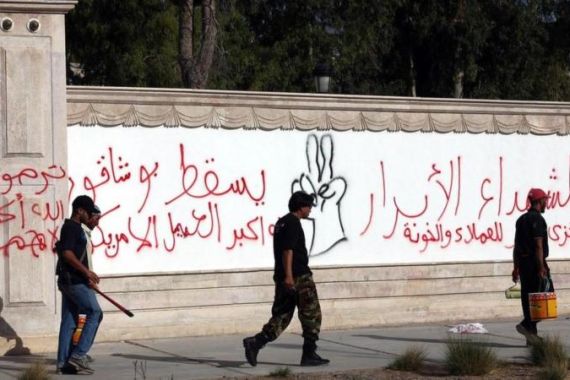Libyans asked to call off anti-militia rally
Tripoli imam asks worshipers to avoid planned street protests, as pro-Salafist marchers throw grenades in Benghazi.

Mosque preachers have told Libyans to call off planned demonstrations against militia groups out of fear marches could lead to renewed bloodshed.
Despite the discouragement, about 400 anti-militia protesters gathered on Friday in Tripoli’s Algeria Square and marched across to the main Martyrs’ Square, chanting and clapping.
Elsewhere, after a rally in Benghazi on Friday in support of a hardline Salafist group which was evicted from the city, demonstrators lobbed hand grenades at security forces and set cars ablaze.
More than 200 men converged on Benghazi’s Al-Jalaa Hospital, which was guarded by members of Ansar al-Sharia until last week.
The crowd then marched on a nearby security forces building, after which interior ministry forces fired warning shots in the air from inside the base.
‘Not be secure’
The mufti of Libya, Sadeq al-Gharyani, had said in a statement published by the LANA state news agency that a march called for after noon prayers should be halted “because this march will not be secure”.
“I call on the people not to participate in this march so that no blood is spilled,” he said. “There are some people who
want to use these protests to cause violence.”
|
|
| Inside Story – Disband deadline for Libya’s militias |
At the Shara Zawiyah mosque in central Tripoli, the preacher called on believers to respect the mufti’s ruling and avoid
demonstrations because it could not be guaranteed they would be peaceful.
Similar speeches were delivered at mosques elsewhere in the capital and in Benghazi.
Libya’s interior ministry said police had been placed on a maximum state of alert to prevent violence for three days
beginning on Thursday.
A week ago, Libyans held a massive, government-backed pro-democracy demonstration in Benghazi, the main city in the
east, which culminated with protesters peacefully sweeping a hardline Islamist militia, Ansar al-Sharia, out of its bases in the city.
That demonstration subsequently turned violent when protesters stormed the headquarters of another militia group,
Rafallah Sehati, which operates with the government’s permission.
Eleven people were killed and scores injured in clashes at a Rafallah Sehati base.
‘Rescue Tripoli Day’
Civil society groups have been calling for a second round of Rescue Benghazi Day demonstrations, and a similar Rescue Tripoli Day demonstration to be held in the capital this week.
Militia groups have said they will hold counter-demonstrations of their supporters.
But the government appears to have decided to discourage the anti-militia street movement for now, after enthusiastically
supporting last week’s Benghazi demonstration when the army flew fighter jets overhead to salute protesters.
“Demonstration is a national right in a democratic state, as long as it is disciplined and presents no danger to the state, and there is no loss of life,” Mustafa Abushagur, prime minister-elect, said late on Thursday.
“It should be conducted in a civilised manner.”
The army’s chief of staff announced on Thursday the military would be barred from participating in demonstrations this week.
Some activists also said the prospect of violence had persuaded them not to protest this week.
“I would like a peaceful protest, but I think this protest on Friday could be used by Gaddafi supporters to cause violence,” Jamal al-Hajji, Tripoli human rights activist, said.
Many Libyans are fed up with the militias, which formed during last year’s civil war that ousted dictator Muammar Gaddafi but still patrol the streets a year later, sweeping people off the streets and holding them in semi-official jails.
Public calls to curb the militia have gathered strength since the killing of Christopher Stevens, the US ambassador, and three other Americans in an attack on the consulate in Benghazi on September 11.
US developments
Since the killing of Stevens, the Libyan government has taken a two-track approach – shutting down Islamist militias like Ansar al-Sharia that operated without official government permission, but also offering public backing to many of the most powerful armed groups, which have official licences to operate.
The US suspects Islamist militia groups played a role in the attack, and praised the Benghazi protesters for rising up against the group.
Fears demonstrations on Friday could turn violent prompted the US embassy in Tripoli, already operating under tight
constraints after the Benghazi attack, to further cut back on staffing temporarily.
Other diplomatic missions also issued cautions about possible unrest.
Also on Friday, US law-enforcement officials say that for security reasons FBI agents are staying away from Benghazi.
The officials said the bureau was not going to put agents in harm’s way and that the city must be made secure before the FBI sends investigators there.
The investigative team arrived in Libya last week to investigate the attack earlier this month.